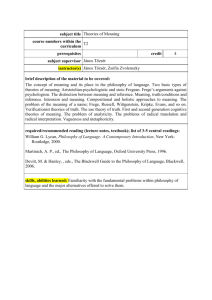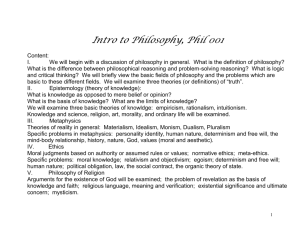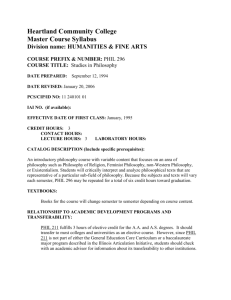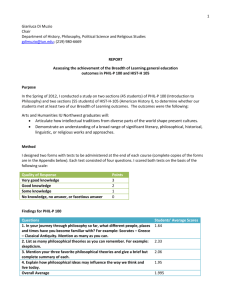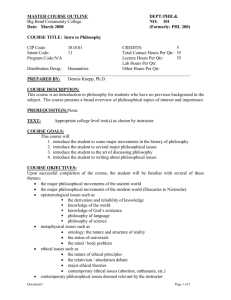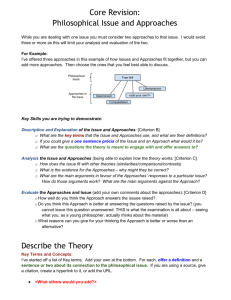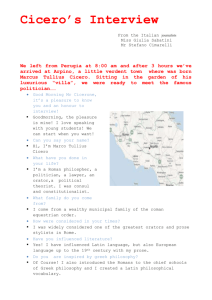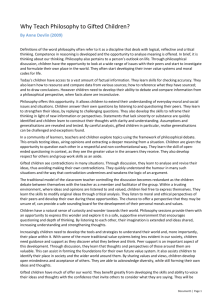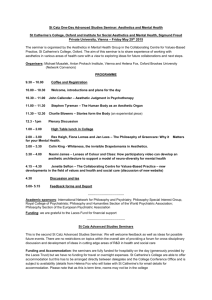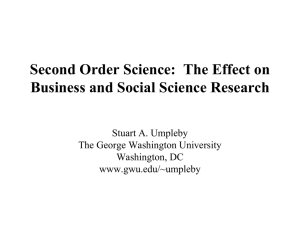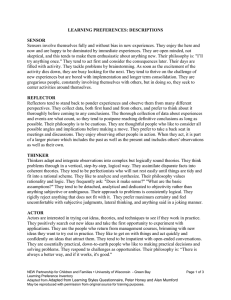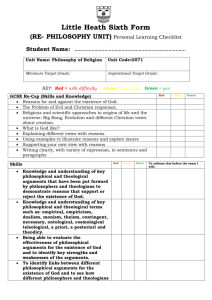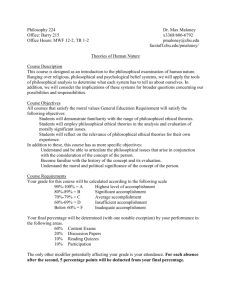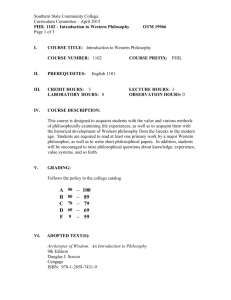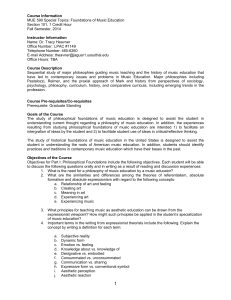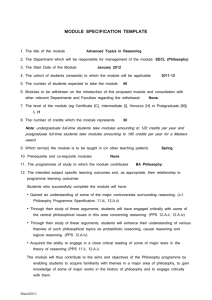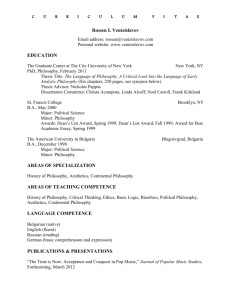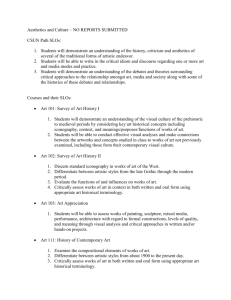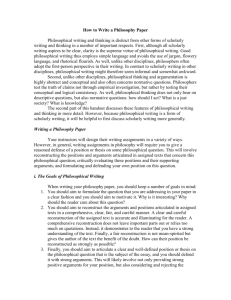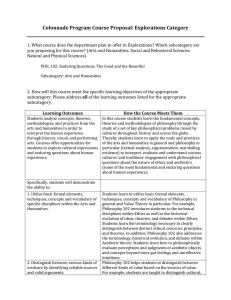PHIL150_2016-01 - Heartland Community College
advertisement
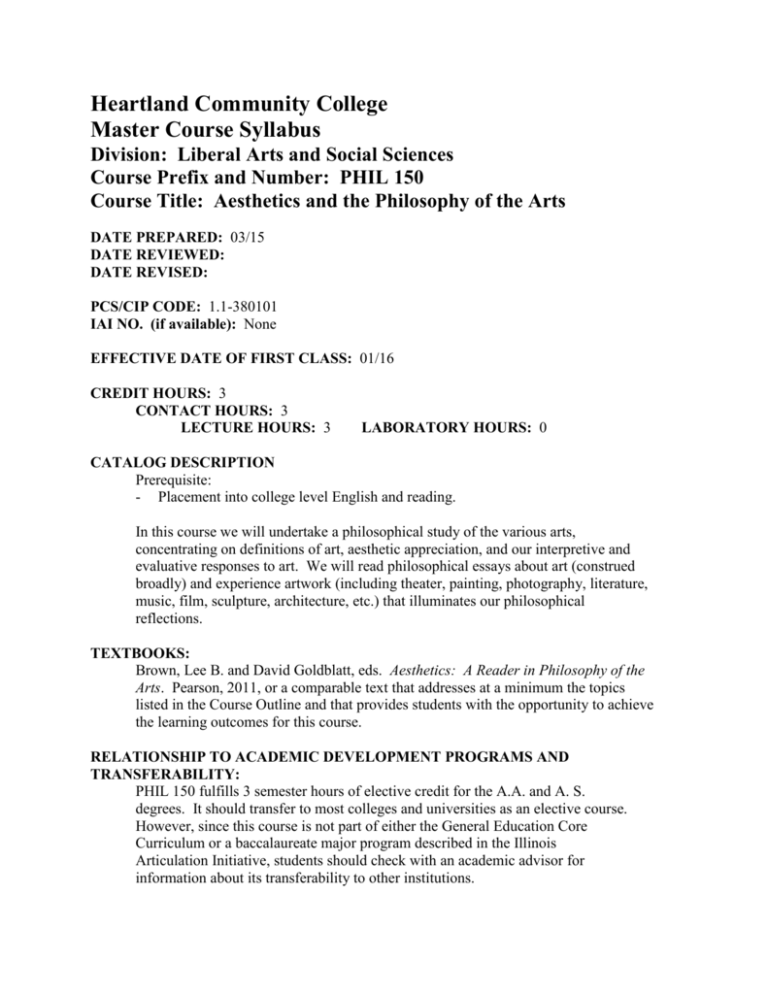
Heartland Community College Master Course Syllabus Division: Liberal Arts and Social Sciences Course Prefix and Number: PHIL 150 Course Title: Aesthetics and the Philosophy of the Arts DATE PREPARED: 03/15 DATE REVIEWED: DATE REVISED: PCS/CIP CODE: 1.1-380101 IAI NO. (if available): None EFFECTIVE DATE OF FIRST CLASS: 01/16 CREDIT HOURS: 3 CONTACT HOURS: 3 LECTURE HOURS: 3 LABORATORY HOURS: 0 CATALOG DESCRIPTION Prerequisite: - Placement into college level English and reading. In this course we will undertake a philosophical study of the various arts, concentrating on definitions of art, aesthetic appreciation, and our interpretive and evaluative responses to art. We will read philosophical essays about art (construed broadly) and experience artwork (including theater, painting, photography, literature, music, film, sculpture, architecture, etc.) that illuminates our philosophical reflections. TEXTBOOKS: Brown, Lee B. and David Goldblatt, eds. Aesthetics: A Reader in Philosophy of the Arts. Pearson, 2011, or a comparable text that addresses at a minimum the topics listed in the Course Outline and that provides students with the opportunity to achieve the learning outcomes for this course. RELATIONSHIP TO ACADEMIC DEVELOPMENT PROGRAMS AND TRANSFERABILITY: PHIL 150 fulfills 3 semester hours of elective credit for the A.A. and A. S. degrees. It should transfer to most colleges and universities as an elective course. However, since this course is not part of either the General Education Core Curriculum or a baccalaureate major program described in the Illinois Articulation Initiative, students should check with an academic advisor for information about its transferability to other institutions. LEARNING OUTCOMES: Course Outcomes: After successfully completing the course, students should be able to 1. Describe the main concerns of aesthetics and the philosophy of the arts. 2. Outline the major theories of art, matching important philosophical positions with the individuals who held them. 3. Identify the problems involved in defining art and appraise the proposed definitions. 4. Evaluate the main conceptual problems in philosophy of art in light of your own experience and knowledge of art. 5. Interpret and evaluate artworks by synthesizing aesthetic concepts from diverse theories of art. 6. Interpret and summarize difficult texts in the philosophy of art and support those interpretations with reasoned arguments (CT 1). 7. Participate in critical and creative dialogues about issues in philosophy of art (CO 1, CO 2). 8. Demonstrate the ability to speak and write critically and analytically about issues in philosophy of art, supporting opinions with arguments, evidence, and reasoning (CO 1, CO 2, CT 2, CT 3). Essential Competencies: CO 1: Students compose a message and provide ideas and information suitable to the topic, purpose, and audience. CO 2: Students effectively deliver a message via various channels/modalities. CT 1: Students gather knowledge, apply it to a new situation, and draw reasonable conclusions in ways that demonstrate comprehension. CT 2: Students determine the value of multiple sources or strategies and select those most appropriate in a given context. CT 3: Students generate an answer, approach, or solution through an effective synthesis of diverse sources and arguments and provide a rationale. Range of Assessment Methods: Assessment methods might include but are not limited to examinations, quizzes, papers, informal writings, oral presentations, debates, and class participation. COURSE/LAB OUTLINE: 1. Aesthetic Value 2. Theories of Art A. Imitation Theories B. Formalist Theories C. Expressionist Theories D. Non-Essentialist Theories E. The Institutional Theory 3. Interpretation 4. Artistic Intention 5. Art, Morality, and Politics 6. The Philosophies of the Individual Arts METHOD OF EVALUATION (Tests/Exams, Grading System): Instructors may determine the most appropriate methods of evaluation for their course. These methods of evaluation might include but are not limited to examinations, quizzes, papers, informal writings, oral presentations, debates, class participation, and attendance. Grading System: 90-100% 80-89% 70-79% 60-69% Below 60% A B C D F REQUIRED WRITING AND READING: The number of pages to be read per week will average between 10 and 20 pages, but because of the difficulty of philosophical reading, most readings will need to be read at least twice. The number of papers to be written in the course and the length of papers will vary across instructors, but the total number of written pages for the course will generally be at least 10-12 pages. (Estimate is based on a 16 week course schedule. Please note if your class is not a 16 week class your weekly reading assignment will be increased.)

